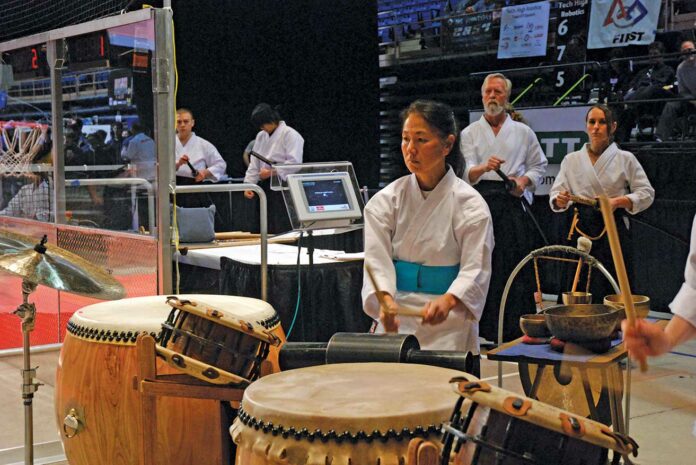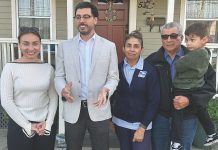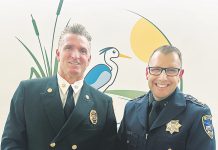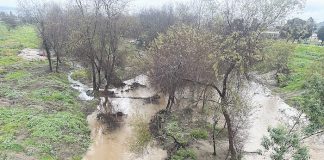
The community is invited to the Obon Festival at the Watsonville Buddhist Temple (423 Bridge St.) Sunday, July 16 from noon to 5pm. Watsonville Taiko will perform at 3pm. The event is free and open to the public.
We spoke with Ikuyo Conant, Sensei and Artistic Director, about Watsonville Taiko, the Obon Festival, and her love of the Taiko art form.
What’s the meaning of the Obon Festival?
Obon is an annual time of joyous celebration and gratitude to the generations who went before us and gave us the gift of life. It’s when their spirits return to visit us. We get together to honor our ancestors. The highlight is colorful dancing which the community is invited to participate in. In Japan, where I am from, the festival is scheduled in relation to the lunar moon. Here it is based on the solar calendar and happens in July. Most traditional Japanese houses have a Buddhist family altar to enshrine their deceased family members and ancestors. People decorate these altars with bamboo and chestnut branches. In Japan, everyone wants to go home for Obon. We feast together and families gather in the cemetery, burn incense, leave out food offerings, and light lanterns to guide the spirits home. Buddhist monks from various communities also visit parishioner’s houses and recite a sutra.
What will people experience at the Obon Festival in Watsonville?
There will be Japanese food, Obon dancing, and other performing arts like Watsonville Taiko. Performers practice the Obon dance, but it is easy to follow, and others can be a part of the circle. People come in a festive mood and are ready to be an active part of it. It’s nice to experience it with different people. Friends are always welcome. It’s a chance to get to know another culture. It’s a time for families, some of whom have left the area, to return to Watsonville to cook together and share the food with the community. To talk about it and connect. It’s a physical experience—we eat and move together.
Taiko drumming is always a happy side of the festival. It offers a powerful sound. Even though Obon is an event for people who have passed away, they’re still alive in the community. People talk about their ancestors and share stories that are passed down to the children. Listening to Taiko drumming we can vibrate together and laugh so hard.
What’s kept Watsonville Taiko going all these years?
We’ve been around for 32 years. We are fortunate to be in Watsonville and Santa Cruz County. People here are interested in learning about other cultures. We couldn’t be here without community support. The Japanese community is very active in the area. At our performances, everyone can be someone on the stage—a beginner or a more experienced drummer. The energy we create goes out to the audience and then comes back to the stage. There’s no difference between the performers and the audience—we are all together.
You’ve been involved in Taiko for more than three decades. What do you like about it?
I’ve been around almost since the group’s beginning. I love that it is physical drumming. I’m interested in the vibration generated by Taiko drumming, how it connects to the body, and how the body reacts. Vibration is how the body stores its experiences and vibration can release memory. Sound is the most important part of Taiko drumming. I think about how the sounds and vibrations resonate and can connect us to each other.
Taiko is a discipline. There are three steps of mastery. You start with the basics. You follow what the teacher says to get the structure of your skill. Then play what you’ve learned on your own. Once you get it, you can break the structure. You have to have the basics, or you can’t get to the roots of Taiko.
My compositions are not traditional. I like to include melodies and softer sounds. Drumming is generally based on the masculine image. I also include the feminine. In the past, taiko drumming was used in war. I’m most interested in exploring how it relates to healing, spirit, and the quiet side.
To learn more about Watsonville Taiko’s classes and performances visit watsonvilletaiko.org.












